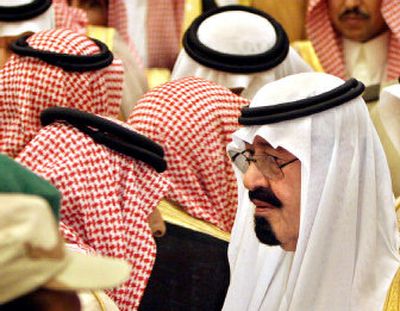Hundreds vow loyalty to new king

RIYADH, Saudi Arabia – Hundreds of tribal chiefs, Islamic clerics, princes and commoners pledged loyalty Wednesday to Saudi Arabia’s new King Abdullah, vowing to “hear and obey” in a traditional Islamic ceremony that seals his status as monarch after a decade as de facto ruler.
Abdullah’s investiture strengthens his hand to push forward with what have been the hallmarks of his unofficial rule – limited steps toward reform and a crackdown on Islamic extremism and militants linked to al-Qaida.
“I promise God and you that I will adopt the Quran as the constitution and Islam as the course, and that all my concerns will be to establish righteousness and justice,” Abdullah said in his first address to the nation as king. “I appeal to you to support me and help me carry this trust and don’t hesitate to advise me.”
Western dignitaries flowed through a Riyadh palace to congratulate the 81-year-old Abdullah and express condolences for the death of his predecessor and half-brother, King Fahd. Abdullah, in white robes and a cream-colored cloak, sat with Britain’s Prince Charles and Prime Minister Tony Blair as well as the king of Sweden and other European heads of state. One key meeting will be with Vice President Dick Cheney.
Saudi Arabia is a major U.S. ally in the Middle East, and Abdullah has worked to repair ties strained by the Sept. 11 attacks, in which 15 of the attackers were Saudis.
Foreign Minister Saud al-Faisal said he expected U.S.-Saudi relations to continue to improve and vowed a “total war” on terrorism.
“We stand firmly against (terrorism) not only militarily with security forces, but also with an ideological plan dealing with the causes and roots of those who joined the evil-doers,” al-Faisal told reporters.
Quoting Abdullah on terrorism, he said: “This disease must be rooted from the body of the politics of Saudi Arabia.”
The allegiance ceremony – known as “bayah” – is key for Abdullah, who has been de facto ruler since Fahd suffered a debilitating stroke in 1995.
Fahd died Monday at age 84.